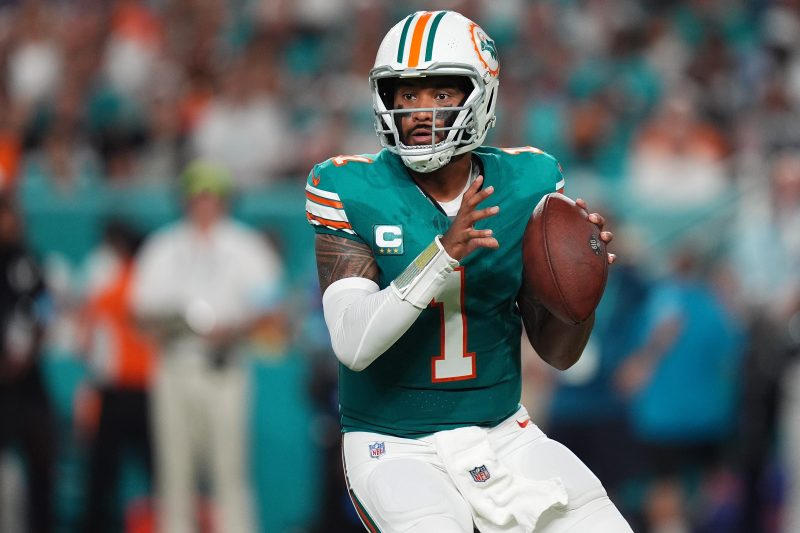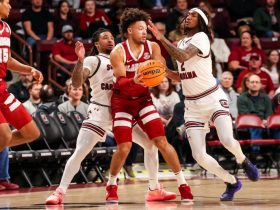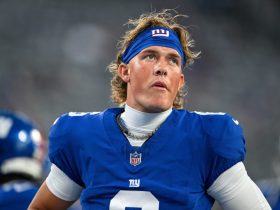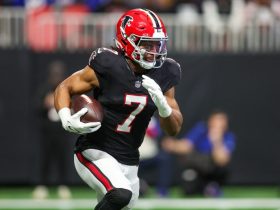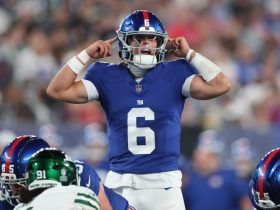Tua Tagovailoa is almost back from his extended concussion layoff. Now let’s hold our collective breath.
The Miami Dolphins’ star quarterback, last seen during an NFL game curled up in the fencing position and then helped off the field after suffering at least his third concussion within two years, returned to practices this week and on Friday was fully cleared to play Sunday against the Arizona Cardinals.
Sure, after the last one, Tagovailoa got wind of the widespread debate and concern about his life, future and career – with so many voices, including credible ones in the NFL universe belonging to former players, urging him to walk away. And he wants to hear none of it. By his own admission, he is oblivious to what others say about him.
“I appreciate your concern, I really do,” Tagovailoa said during a news conference this week, asked to respond to the sentiments. “I love this game, and I love it to the death of me. That’s it.”
What a chilling choice of words.
NFL STATS CENTRAL: The latest NFL scores, schedules, odds, stats and more.
Tagovailoa, 26, undoubtedly hates being the walking poster image for concussion risk. Yet for all the spark he can inject into Miami’s offense – the deep passing game that can strike in a heartbeat with speedy receivers Tyreek Hill and Jaylen Waddle has been non-existent as team has stumbled to 2-4 during Tagovailoa’s absence – even more intrigue will come with the next big hit.
Or maybe even with a not-so-big hit, given how Tagovailoa went down the last time on Sept. 12, when he barreled into Buffalo Bills safety Damar Hamlin for a collision that was only so intense by typical football standards.
He knows. It’s an accepted truth in the medical community: The more concussions a person sustains, the more susceptible they are to another one. Tagovailoa discussed that with the experts he consulted with during recent weeks but hasn’t reached a conclusion when it comes to future risk.
You’d think it has to be sobering, though, for any player who has suffered multiple concussions to consider whether they are at risk for developing chronic traumatic encephalopathy (CTE) or other long-term degenerative brain conditions.
“I think the brain is – there’s just a gray area when it comes to that,” Tagovailoa said. “If you do know that you’re going to get long-term disease from it, or you’re not, I just think there’s a lot of gray area with it. For me, this is what I love to do. This is what makes me happy and I’m going to do it, that’s it.”
But still: How many concussions are too many? How does that factor into risk?
“I don’t know if there’s a magic number, but the number that’s always been mentioned as far as I know is three or more in a finite period of time,” Dr. Julian Bailes, a renowned neurosurgeon with Endeavor Health in suburban Chicago, told USA TODAY Sports.
“So, three or more in rapid succession has always been to me cause for pause. And to take time off to hopefully let it heal. But then you’ve got the other factor, the susceptibility, the threshold to getting a concussion being lowered.”
As Tagovailoa alluded to, the gray area in understanding his case includes his rebound from the setbacks in 2022; he played the entire 2023 season (starting all 17 regular-season games and one postseason contest) without suffering a concussion. Then again, the image of him going down again early this season brought an immediate flashback to two seasons ago. After the extended window for rest and healing – Tagovailoa maintains that he was symptom-free the day after he suffered his latest concussion and has been throwing for five weeks while on injured reserve – he now has been medically cleared to play.
The final steps of the NFL’s graduated return-to-play protocols for Tagovailoa were clearance from the Dolphins medical staff and an independent neurologist.
Yet given his history, Tagovailoa’s case isn’t just about whether he’s fit to play now. Allen Sills, the NFL’s chief medical adviser, allows that even with a player’s concussion history, there’s no scientific formula that can calculate concussion risk. Variables that are unique from one case to another – such as the number of concussions, duration of symptoms, conditions when the injury occurred – are obviously considered.
“Then it’s a best guess,” Sills told reporters during a conference call earlier this month. “A guess at what (is) someone’s future risk of concussion.”
If a player is medically cleared, the NFL or NFL Players Association won’t suggest that a player retire. The ultimate decision belongs to the player – who, of course, could be influenced by family or advisers. Tagovailoa said that he never considered walking away from the sport after his latest setback. Although he discussed his future with his family following the concussions in 2022, he didn’t seek any input from family members beyond his wife, Annah, this time around.
As Sills put it, “patient autonomy” is an essential element included in the process of gathering input from doctors when considering a player’s future risk. The league’s primary objective, he said, is to ensure its return-to-play protocols are followed to heal from the acute injury, without having a role in the player’s decision about his future.
But what if the “patient’s voice” is misguided? Ill-informed? Naive? Egocentric? Disillusioned? If someone has suffered from a brain injury – and scientifically there’s gray area to determine the extent of the injury – perhaps that voice represents an inherent flaw in the equation.
Interestingly, Tagovailoa said the Dolphins’ decision to put him on injured reserve for the minimum of four weeks was a matter of the team “protecting myself from myself” because the Dolphins realized that, as a competitor, he would want to hurry back to the lineup. Dolphins coach Mike McDaniel, though, said the decision was based on medical advice that dictated the quarterback have an extended window for rest and recovery.
In any event, there’s no doubt that Tagovailoa’s “patient’s voice” is still plenty determined. Or downright defiant.
Someone asked a hypothetical question about how he might react to advice from doctors to take a longer period off if he suffered another concussion.
“Man, I just think it’s based on whatever that individual feels,” Tagovailoa said. “If you feel like you can go, you can go.”
It was striking that he was so cavalier in considering that question under such a condition.
“I just think this is only becoming a thing just because of what ended up happening two years ago for myself within the sport,” Tagovailoa added. “I hate that it’s happened, but we don’t look at boxers the same way. We don’t look at hockey players the same way, but I just think because of what happened in the magnitude that that had, that it’s becoming more of an issue here in the league.”
When the NFL revised protocols after Tagovailoa’s cases in 2022, it was a response to the optics to the quarterback not being diagnosed with a concussion when knocked out of a game against Buffalo (it was announced as a neck injury), only to suffer a concussion four days later when his head bounced off the turf at Cincinnati. The NFLPA fired the independent neurotrauma consultant who examined Tagovailoa after the initial injury, which ultimately set off the chain of events that led to revised protocols.
Still, Tagovailoa is fooling himself if he thinks the scrutiny of his case isn’t part of the larger picture. The emphasis on concussions ramped up years before the quarterback entered the league in 2020.
Bailes was at the cutting edge of research efforts two decades ago, partnering with Dr. Bennet Omalu, who discovered CTE, presenting findings to the NFL. He is concerned about Tagovailoa, in part because of what is unknown about the risks. As Bailes pointed out, a big breakthrough for concussion research will come when doctors are able to diagnose CTE and other degenerative brain conditions in living patients.
“My best wishes for him; I hope it turns out,” said Bailes, who is also on the advisory board for the Chuck Noll Foundation for Brain Injury Research. “I hope he can play in as safe a way as possible, maybe sliding more instead of running and putting his head in there, trying to get more yardage.”
Tagovailoa acknowledges a need to make better decisions, maintaining that he can play smarter – even if his tendency to run with reckless abandon has been part of his edge since high school. He won’t wear a Guardian Cap, the layer of foam padding fixated over the standard helmet to reduce the shock absorbed on hits. Instead, he’s wearing the top-rated “Guardian Cap-compliant’ helmet for quarterbacks, the VICIS ZERO2 MATRIX ID QB, which the league maintains is as safe or safer than wearing a helmet with a Guardian Cap.
Tagovailoa also expressed a desire to stay more available for his team, which incidentally in August signed him to a massive four-year, $212.4 million contract extension. His deal included $167.171 million in guarantees, according to Spotrac.com, so his decision to play doesn’t seem to hinge on money.
Still, it’s when pondering the long-term risk that Tagovailoa sounds like a man with a certain blind spot.
“How much risk do we take when we get up in the morning to drive to work?” he said. “Get into a car crash, I don’t know. Everything, I think, takes risk…Every time we suit up, we’re all taking a risk that we could potentially get hurt, whether it’s a concussion, a broken bone, anything. You get up off the bed the wrong way, you potentially could risk spraining your ankle. There’s just risk in any and everything and I’m willing to play the odds.”
It’s just that some odds cost a lot more.
This story has been updated with new information.

